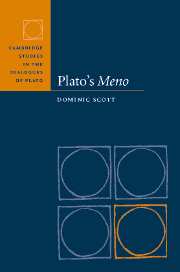Book contents
- Frontmatter
- Contents
- Acknowledgements
- Introduction
- Part I
- Part II
- Chapter 6 The stingray: 79e–80d
- Chapter 7 ‘Meno's paradox’: 80d–81a
- Chapter 8 The emergence of recollection: 81a–e
- Chapter 9 The argument for recollection: 82b–85d
- Chapter 10 The conclusion: 86b6–c2
- Part III
- Conclusion
- Appendices
- References
- Index of ancient passages
- General index
Chapter 8 - The emergence of recollection: 81a–e
Published online by Cambridge University Press: 29 September 2009
- Frontmatter
- Contents
- Acknowledgements
- Introduction
- Part I
- Part II
- Chapter 6 The stingray: 79e–80d
- Chapter 7 ‘Meno's paradox’: 80d–81a
- Chapter 8 The emergence of recollection: 81a–e
- Chapter 9 The argument for recollection: 82b–85d
- Chapter 10 The conclusion: 86b6–c2
- Part III
- Conclusion
- Appendices
- References
- Index of ancient passages
- General index
Summary
THE RELIGIOUS BACKGROUND
When Socrates proposes to reveal a doctrine (logos) that he has heard from various religious sources, Meno is agog: what is this logos and who originated it? The doctrine, Socrates replies, comes from priests, priestesses and divinely inspired poets:
They say that the human soul is immortal, and sometimes it comes to an end – which they call ‘dying’ – and sometimes it is re-born, but it never perishes. Because of this, one must lead one's life as piously as possible. For those
from whom Persephone accepts requital for ancient wrong [or: grief]
Their souls she sends back to the sun above in the ninth year.
From these grow noble kings and men swift in strength and greatest in wisdom.
For the rest of time men call them sacred heroes.
(81b3–c4)First, we need to make some sense of these extremely allusive lines. Socrates starts by making two claims – that the soul is immortal and is subject to reincarnation – and from these he derives the injunction to live as piously as possible, something that the verses are supposed to explain (cf. γάρ 81b7). The point seems to be that, because of some ancient wrong (perhaps committed against Persephone herself), our penalty is to pass through a series of incarnations. If in the course of them we act piously, Persephone may be satisfied and reward us. This would be done after a fixed period of time spent in the underworld, viz. nine years.
- Type
- Chapter
- Information
- Plato's Meno , pp. 92 - 97Publisher: Cambridge University PressPrint publication year: 2006



